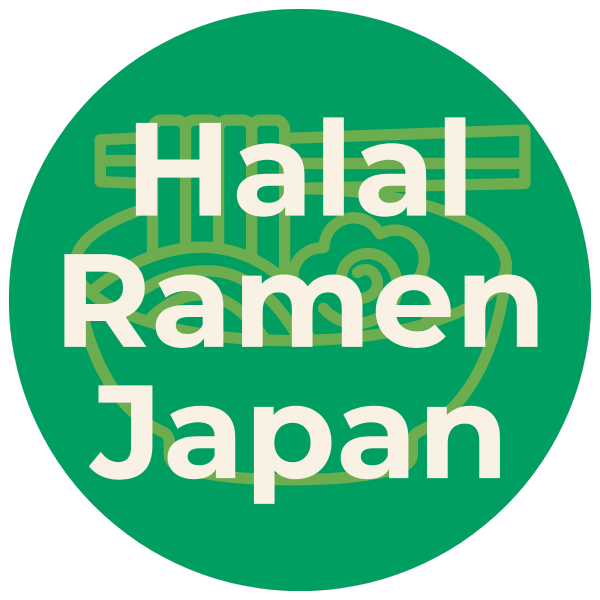Vegan vs Halal Ramen in Japan: What's the Difference and How to Choose?
- Halal Ramen Japan

- Apr 19, 2025
- 3 min read
Updated: Apr 24, 2025

🌏 Introduction
As more Muslim and vegan travelers visit Japan, many wonder: “Is vegan ramen also halal?” or “Can Muslims eat vegetarian ramen in Japan?” While these terms may seem similar, they have important differences—especially in a country where religious dietary restrictions are still not widely understood.
This article will clarify the differences between halal, vegetarian, and vegan ramen in Japan, highlight common misunderstandings, and offer practical tips to help you enjoy Japanese food safely.
🍜 1. Halal, Vegetarian, and Vegan – What's the Difference?

Halal: Permissible under Islamic law. No pork, no alcohol, and all meat must be slaughtered according to Islamic practices.
Vegetarian: No meat or seafood, but dairy and eggs are allowed.
Vegan: No animal products of any kind, including meat, fish, dairy, eggs, gelatin, and honey.
Important: Just because ramen is labeled “vegetarian” in Japan doesn't mean it’s free from animal-based broth or seasonings.
🇯🇵 2. Why Misunderstandings Are Common in Japan

In Japan, many people choose vegetarian or vegan food not for religious or ethical reasons, but for health or dietary preferences. As a result, restaurants may offer plant-based options without fully understanding the strict requirements of halal, vegan, or vegetarian diets.
Additionally, some restaurants unknowingly use processed ingredients or seasonings that contain alcohol or animal-derived components—even when the base ingredients appear to be plant-based or pork-free.
For example:
Ramen toppings like menma (bamboo shoots) or sauces like tare (seasoning base) may contain mirin, sake, or animal extracts from the manufacturing process.
Some dishes may use chicken or fish broth even in “vegetarian” options.
That’s why simply reading the menu isn’t enough. Always ask staff about ingredients or choose certified halal restaurants for peace of mind.
🏷️ 3. Understanding Halal-Labeled Restaurants

Some restaurants in Japan may describe their food as “halal-friendly” because they use halal-certified ingredients. However, this doesn’t always mean the restaurant itself is halal-certified.
✅ Key difference:
Halal-certified restaurant: The kitchen, equipment, and staff practices meet halal standards, and the restaurant has been reviewed by a certification body.
Uses halal ingredients: Some or all ingredients are halal, but cross-contamination or alcohol use may still occur.
For Muslim travelers, choosing a fully halal-certified restaurant is the safest option.
🥦 4. What to Check in Vegan or Vegetarian Ramen
Even if a dish looks plant-based, always ask about:
Broth: Is it made with fish, chicken, or pork stock?
Seasonings: Does it contain mirin, sake, or dashi (fish-based)?
Oils and toppings: Are there animal-based fats, eggs, or gelatin?
Some vegan ramen shops in Tokyo, Kyoto, and Osaka clearly label ingredients—but always double-check, especially if the shop offers non-vegan items too.

🤔 5. Is Vegan Ramen Always Halal?
Not necessarily. While vegan ramen avoids animal products, it may still contain alcohol-based seasonings like mirin or soy sauce brewed with alcohol.
If you’re a Muslim traveler looking for halal options:
Some vegan dishes may be halal by ingredient but lack certification or verification.
It’s best to confirm with staff or choose halal-certified restaurants.
✅ 6. How to Choose the Right Ramen in Japan
✅ If you're Muslim: Look for halal-certified restaurants with verified menus and trained staff.
✅ If you're vegan/vegetarian: Ask detailed questions about broth, seasonings, and toppings.
✅ Use platforms like Halal Ramen Japan or Halal Eats Japan to find trustworthy listings.
📌 Conclusion

Halal and vegan ramen are both expanding in Japan—but they are not the same. Knowing the difference helps you enjoy Japanese food without compromising your beliefs. When in doubt, choose restaurants that clearly label their menus or hold halal certification.
Safe, delicious, and respectful dining starts with informed choices.





Comments